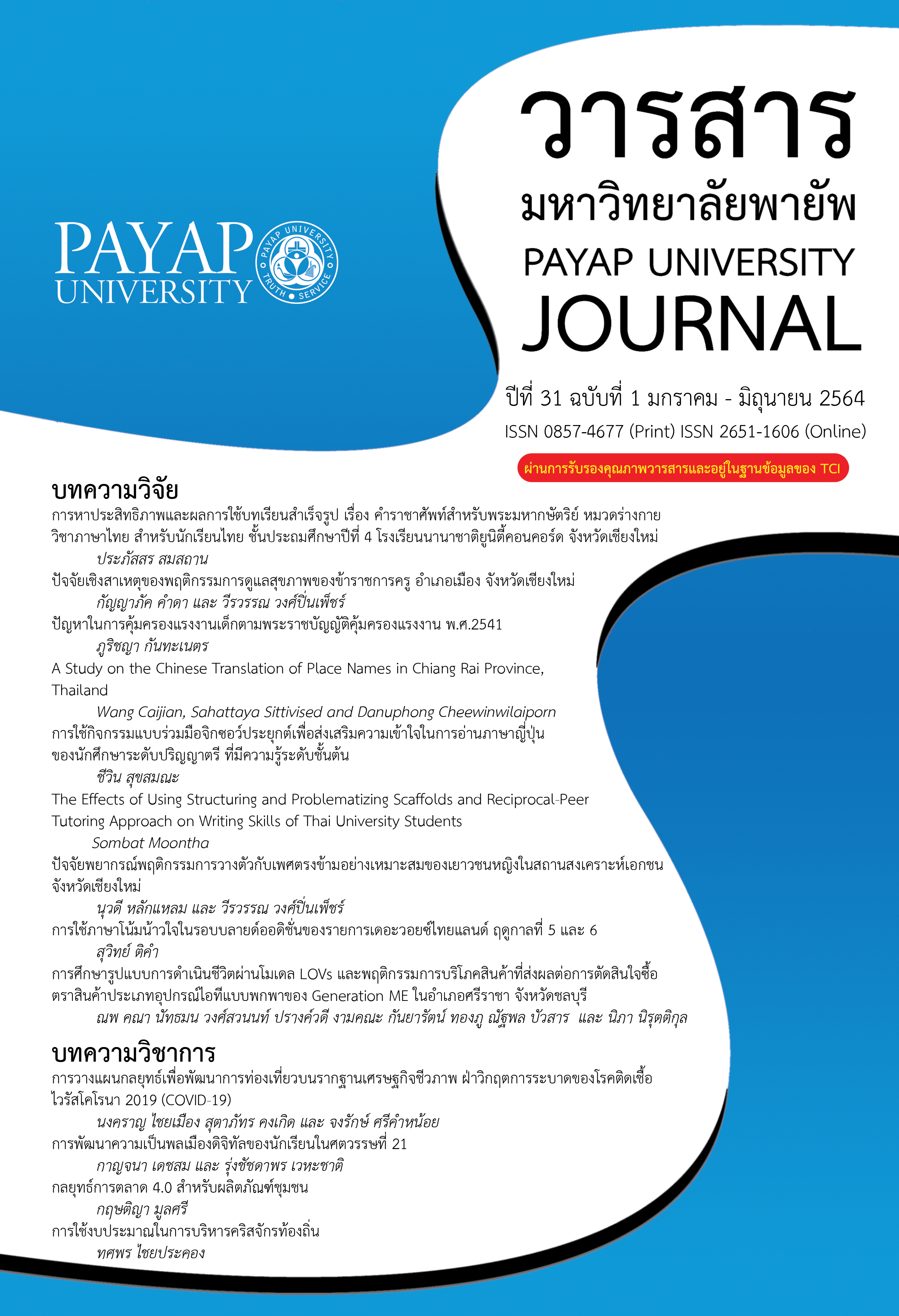ผลการใช้การเสริมต่อการเรียนรู้แบบเน้นโครงสร้าง และการแก้ปัญหาร่วมกันกับเทคนิคการสอนแบบแลกเปลี่ยนระหว่างเพื่อน ต่อทักษะการเขียนภาษาอังกฤษของนักศึกษาระดับปริญญาตรีของไทย
Main Article Content
บทคัดย่อ
งานวิจัยฉบับนี้ มีวัตถุประสงค์เพื่อศึกษาผลการใช้เครื่องมือการสอนแบบใช้โครงสร้างและการแก้ปัญหาในการเสริมต่อการเรียนรู้ร่วมกัน กับเทคนิคการสอนแบบแลกเปลี่ยนระหว่างเพื่อน (SPRint) ต่อทักษะการเขียนภาษาอังกฤษของนักศึกษาระดับปริญญาตรีของไทย ประชากร คือ กลุ่มนักศึกษาระดับอุดมศึกษาจำนวน 42 คน ตัวอย่างได้มาจากการสุ่มแบบกลุ่ม และถูกแบ่งออกเป็นสองกลุ่มย่อย คือ 23 คนแรก อยู่ในกลุ่มทดลอง และ 19 คน อยู่ในกลุ่มควบคุม โดยทั้งหมด เรียนการเขียนบทอนุเฉทจาก 3 แบบอรรถฐาน ผลจากการวิเคราะห์ข้อมูลที่ได้จากการทดสอบก่อนและหลังสอบของการวิจัยเชิงทดลองครั้งนี้ ซึ่งใช้สถิติพรรณนาผ่านค่ากลาง ค่าทดสอบความแตกต่างเฉลี่ยของประชากร และค่าทดสอบความแตกต่างเฉลี่ยประชากรที่เป็นอิสระต่อกัน พบว่า เครื่องมือการสอนดังกล่าว มีผลทำให้คะแนนการเขียนของกลุ่มทดลองในการสอบหลังการสอน ( = 5.94, คะแนนเต็ม = 10) เพิ่มขึ้น อย่างมีนัยยะสำคัญที่ P=0.035 จากคะแนน pre-test ( = 4.7, คะแนนเต็ม = 10) และยังพบว่า การใช้กิจกรรมการเรียนรู้แบบร่วมมือร่วมกับเครื่องมือ SPRint ช่วยให้ผู้เรียนมีทักษะในการจัดลำดับความคิดรวมถึงการเขียนบรรยายเนื้อหาที่ครบถ้วน และใช้ภาษาและโครงสร้างประโยคที่เป็นมาตรฐานอย่างถูกต้องเพิ่มมากขึ้นในเวลาอันสั้น นอกจากนี้ ข้อค้นพบจากการวิจัยสามารถยังประโยชน์ต่อคณาจารย์ที่ต้องการพัฒนาการสอนเขียนภาษาอังกฤษแบบแลกเปลี่ยนระหว่างเพื่อน
Article Details
เอกสารอ้างอิง
Boonteerarak, P., Jenwachirapong, R., Chantraboon, S., & Thepud, S. (2020). The develolpment of a communicative English training curriculum for counter clerks in convenience retailing stores in Chiang Mai Province. Payap University.
Boonyarattanasoontorn, P. (2017). An investigation of Thai students’ English language writing difficulties and their use of writing strategies. Journal of Advanced Research in Social Sciences and Humanities, 2(2), 111-118.
Bradford-Watts, K. (2011). Students teaching students? Peer teaching in the EFL classroom in Japan. The Language Teacher, 35(5), 31-35.
Chiravate, B. (2011). The role of narrative structure in the acquisition of English tense-aspect morphology by thai learners. Journal of Pan-Pacific Association of Applied Linguistics, 15(2), 27-43.
Ertmer, P. A., & Glazewski, K. D. (2019). Scaffolding in PBL environments: Structuring and problematizing relevant task features. In M. Moallem, W. Hung, & N. Nada Dabbagh (Eds.), The Wiley Handbook of Problem‐Based Learning (pp. 321-342). Hoboken, NJ: John Wiley & Sons.
Falchikov, N. (2001). Learning together: Peer tutoring in higher education. New York, NY: Psychology Press.
Flower, L., & Hayes, J. R. (1981). A cognitive process theory of writing. College Composition and Communication, 32(4), 365-387.
Gupita, M. R., & Suryaman, M. (2019). The effects of reciprocal teaching strategy on writing review text by using short stories. In International Conference on Interdisciplinary Language, Literature and Education (ICILLE 2018) (pp.219-223).
Hiranburana, K. (2017). Use of English in the Thai workplace. Kasetsart Journal of Social Sciences, 38(1), 31-38.
Jafarigohar, M., & Mortazavi, M. (2017). The impact of scaffolding mechanisms on EFL learners’ individual and socially shared metacognition in writing. Reading & Writing Quarterly, 33(3), 211-225. https://doi.org/10.1080/10573569.2016.1154488
Kaur, A., Young, D., & Kirkpatrick, R. (2016). English education policy in Thailand: Why the poor results? In English language education policy in Asia (pp. 345-361). New York, NY: Springer.
Kongkerd, W. (2013). Teaching English in the era of English used as a lingua franca in Thailand. Executive Journal, 33(4), 3-12.
Kuadnok, K. (2017). Pedagogies and power relations in Thai English foreign language writing classrooms: A critical ethnography. (Publication No. 106915) [Doctoral dissertation, Queensland University of Technology, Australia]. https://doi.org/ 10.5204/thesis.eprints.106915
Molenaar, I., Sleegers, P., & van Boxtel, C. (2014). Metacognitive scaffolding during collaborative learning: a promising combination. Metacognition and Learning, 9(3), 309-332.
Nnamani, A. P., Akabogu, J. U., Uloh-Bethels, A. C., & Ede, M. O. (2018). Effect of reciprocal peer tutoring strategy on computer students’ achievement in expository essay writing: Implication for school counselling. International Journal of Applied Engineering Research, 13(21), 15102-15107.
Piamsai, C. (2020). The effect of scaffolding on non-proficient efl learners’ performance in an academic writing class. LEARN Journal: Language Education and Acquisition Research Network, 13(2), 288-305.
Reiser, J. B. (2004). Scaffolding complex learning: The mechanisms of structuring and problematizing student work. The Journal of the Learning sciences, 13(3), 273-304.
Rollinson, P. (2005). Using peer feedback in the ESL writing class. ELT journal, 59(1), 23-30.
Seensangworn, P., & Chaya, W. (2017). Writing problems and writing strategies of English major and non-English major students in a Thai university. MANUTSAT PARITAT: Journal of Humanities, 39(1), 113-136.
Sumarno, W. K. (2019). Effects of edmodo-assisted process writing with the problematized scaffolding on the quality of students’ writing. Lingua Cultura, 13(1), 31-37.
Topping, K., Buchs, C., Duran, D., & van Keer, H. (2017). Effective peer learning: From principles to practical implementation. Oxford, UK: Taylor & Francis.
Villarreal, I., & Gil-Sarratea, N. (2020). The effect of collaborative writing in an EFL secondary setting. Language Teaching Research, 24(6), 874-897.
Vonna, Y., Mukminatien, N., & Laksmi, E. D. (2015). The effect of scaffolding techniques on students’ writing achievement. Jurnal Pendidikan Humaniora, 3(3), 227-233.
Vygotsky, L. S. (1980). Mind in society: The development of higher psychological processes. Cambridge, MA: Harvard university press.


